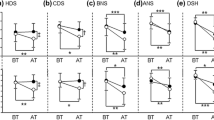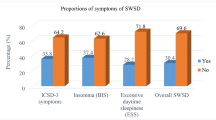Abstract
Introduction: Sufficient and good quality sleep is crucial for shift workers because of its implications for alertness, recovery and health. The aim of the study was to follow the effects of night shifts and overtime work on sleep and fatigue of hospital nurses in Bulgaria.
Methods: The study is cross-sectional and comprised 1340 nurses of age 50.1 ± 10.1 years from Sofia hospitals. Anonymous questionnaire survey included Karolinska Sleep Diary, demographic information, work place variables, working hours and shift system. The statistical analyses were carried out with SPSS.
Results: 27.4% of the nurses worked only day shifts, but part of them were with history of night shifts. 18.9% worked from 1 to 4 night shifts, and 46.7% more than 5 night shifts. Great deal of the nurses worked more than 40 h weekly as follows: 34.2% worked 41–50 h per week, 16.8% - 51–60 h and 10.6% >61 h. The reported sleep duration did not differ between the groups of nurses working day shifts and different number of night shifts or with the number of work hours weekly. The quality of sleep, estimated by SQI was worse with the increase of number of night shifts and in comparison to nurses working only day shifts (F = 6.877, p = 0.000) and with increase of the hours worked weekly (F = 5.085, p = 0.002). With the increase of the number of night shifts and the working hours weekly the insufficiency of sleep, fatigue in the morning after awakening and sleep throughout increased highly significantly.
Discussion: Shift working with more night shifts monthly and overtime hours weekly contributed to impaired sleep in the studied group of nurses. The sleep impairment was more evident within the increase in the number of night shifts.
Access this chapter
Tax calculation will be finalised at checkout
Purchases are for personal use only
Similar content being viewed by others
References
Hughes R (2008) Patient safety and quality: an evidence-based handbook for nurses. AHRQ Publication No. 08-0043. Rockville, MD
Zhang L, Sun DM, Li CB, Tao MF (2016) Influencing factors for sleep quality among shift-working nurses: a cross-sectional study in China using 3-factor Pittsburgh sleep quality index. Asian Nurs Res 10(4):277–282. https://doi.org/10.1016/j.anr.2016.09.002
Wagstaff AS, Sigstad Lie JA (2011) Shift and night work and long working hours-a systematic review of safety implications. Scand J Work Environ Health 37(3):173–185. https://doi.org/10.5271/sjweh.3146
Frost P, Kolstad HA, Bonde JF (2009) Shift work and the risk of ischemic heart disease - a systematic review of the epidemiologic evidence. Scand J Work Environ Health 35(3):163–179. https://doi.org/10.5271/sjweh.1319
Puttonen S, Härmä M, Hublin C (2010) Shift work and cardiovascular disease - pathways from circadian stress to morbidity. Scand J Work Environ Health 36(2):96–108. https://doi.org/10.5271/sjweh.2894
Vyas MV, Garg AX, Iansavichus AV, Costella J, Donner A, Laugsand LE et al (2012) Shift work and vascular events: systematic review and meta-analysis. BMJ 345:e4800. https://doi.org/10.1136/bmj.e4800
Knutsson A, Bøggild H (2010) Gastrointestinal disorders among shift workers. Scand J Work Environ Health 36(2):85–95. https://doi.org/10.5271/sjweh.2897
Pan A, Schernhammer ES, Sun Q, Hu FB (2011) Rotating night shift work and risk of type 2 diabetes: two prospective cohort studies in women. PLoS Med 8(12):e1001141. https://doi.org/10.1371/journal.pmed.1001141
Puttonen S, Oksanen T, Vahtera J, Pentti J, Virtanen M, Salo P et al (2010) Is shift work a risk factor for rheumatoid arthritis? The Finnish public sector study. Ann Rheum Dis 69(4):779–780. https://doi.org/10.1136/ard.2008.099184
Hedstrom AK, Akerstedt T, Hillert J, Olsson T, Alfredsson L (2011) Shift work at young age is associated with increased risk for multiple sclerosis. Ann Neurol 70(5):733–741. https://doi.org/10.1002/ana.22597
Ijaz S, Verbeek J, Seidler A, Lindbohm ML, Ojajärvi A, Orsini N et al (2013) Night-shift work and breast cancer – a systematic review and meta-analysis. Scand J Work Environ Health 39(5):431–447. https://doi.org/10.5271/sjweh.3371
Åkerstedt T, Knutsson A, Narusyte J, Svedberg P, Kecklund G, Alexanderson K (2015) Night work and breast cancer in women: a Swedish cohort study. BMJ Open 5(4):e008127. https://doi.org/10.1136/bmjopen-2015-008127
Dembe AE, Erickson JB, Delbos RG, Banks SM (2005) The impact of overtime and long work hours on occupational injuries and illness: new evidence from the United States. Occup Environ Med 62(9):588–597. https://doi.org/10.1136/oem.2004.016667
Folkard S, Tucker P (2003) Shift work, safety, and productivity. Occup Med 53(2):95–101. https://doi.org/10.1093/occmed/kqg047
van der Hulst M (2003) Long workhours and health. Scand J Work Environ Health 29(3):171–188. https://doi.org/10.5271/sjweh.720
Yang H, Schnall PL, Jauregui M, Su TC, Baker D (2006) Work hours and self-reported hypertension among working people in California. Hypertension 48(4):744–750. https://doi.org/10.1161/01.HYP.0000238327.41911.52
Ferri P, Guadi M, Marcheselli L, Balduzzi S, Magnani D, Di Lorenzo R (2016) The impact of shift work on the psychological and physical health of nurses in a general hospital: a comparison between rotating night shifts and day shifts. Risk Manag Healthc Policy 9:203–211. https://doi.org/10.2147/RMHP.S115326
Härmä M (2006) Workhours in relation to work stress, recovery and health. Scand J Work Environ Health 32(6):502–514. https://doi.org/10.5271/sjweh.1055
Tucker P, Folkard S, Ansiau D, Marquié J-C (2011) The effects of age and shiftwork on perceived sleep problems: results from the VISAT-combined longitudinal and cross-sectional study. J Occup Environ Med 53(7):794–798. https://doi.org/10.1097/JOM.0b013e318221c64c
Sveinsdóttir H (2006) Self-assessed quality of sleep, occupational health, working environment, illness experience and job satisfaction of female nurses working different combination of shifts. Scand J Caring Sci 20(2):229–237. https://doi.org/10.1111/j.1471-6712.2006.00402.x
Bjorvatn B, Dale S, Hogstad-Erikstein R, Fiske E, Pallesen S, Waage S (2012) Self-reported sleep and health among Norwegian hospital nurses in intensive care units. Nurs Crit. Care 17(4):180–188. https://doi.org/10.1111/j.1478-5153.2012.00504.x
Author information
Authors and Affiliations
Corresponding author
Editor information
Editors and Affiliations
Rights and permissions
Copyright information
© 2019 Springer Nature Switzerland AG
About this paper
Cite this paper
Cekova, I., Stoyanova, R., Dimitrova, I., Vangelova, K. (2019). Sleep and Fatigue in Nurses in Relation to Shift Work. In: Bagnara, S., Tartaglia, R., Albolino, S., Alexander, T., Fujita, Y. (eds) Proceedings of the 20th Congress of the International Ergonomics Association (IEA 2018). IEA 2018. Advances in Intelligent Systems and Computing, vol 819. Springer, Cham. https://doi.org/10.1007/978-3-319-96089-0_21
Download citation
DOI: https://doi.org/10.1007/978-3-319-96089-0_21
Published:
Publisher Name: Springer, Cham
Print ISBN: 978-3-319-96088-3
Online ISBN: 978-3-319-96089-0
eBook Packages: Intelligent Technologies and RoboticsIntelligent Technologies and Robotics (R0)




